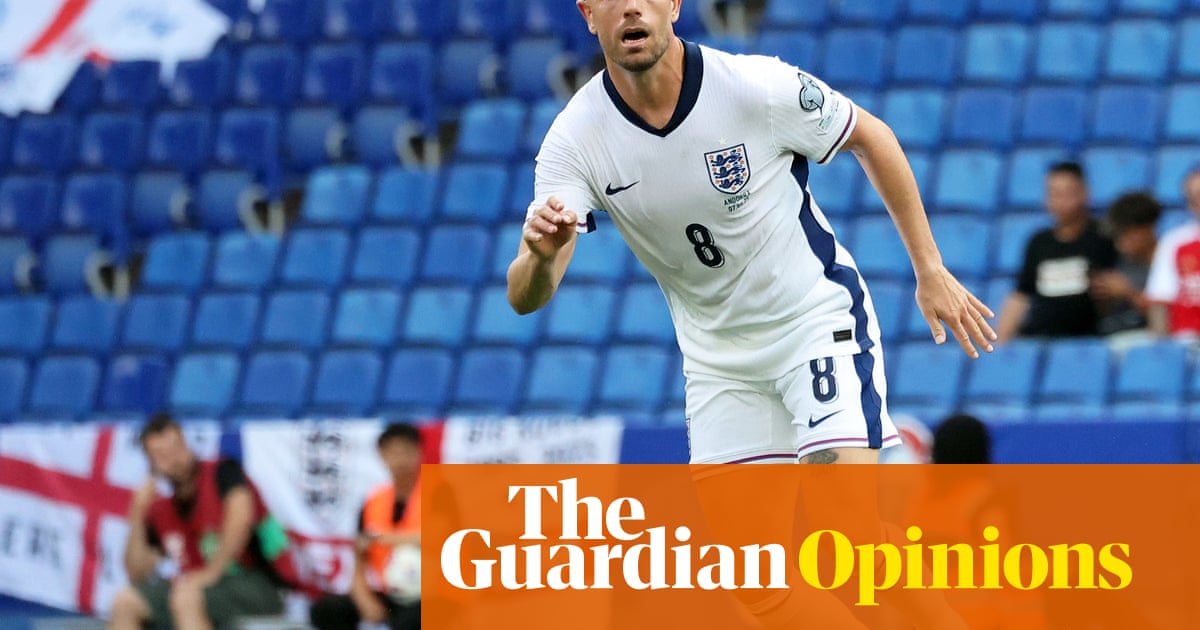The tendency is always to gloom. How could it not be? Nobody could have sat throughEngland’s 1-0 win over Andorraon Saturday and not felt a profound sense of frustration. Six million years of human evolution has culminated in this? When the England manager shrugs and says he can’t blame the fans for booing, you know it was bad.
Thomas Tuchel was a short-term appointment. He’s not in the post for pathways or development or creating a culture. He’s here to win the World Cup next summer. In the boozy, drowsy somnolence of the RCDE Stadium, that felt a preposterous ambition. Look at England’s rivals.
Argentina are playing mesmerising football and top the Conmebol standing by 10 points. Spain were brilliant European champions having incorporated two young and devastating wide forwards into their passing carousel. France are pumping out teenagers of extraordinary technical quality by the bucketload to elevate the dour structures of Didier Deschamps. Portugal beat Germany in their Nations League semi-final last week, but both looked high-level sides. Even Brazil have finally accepted reality and turned to a foreign coach in Carlo Ancelotti. Everybody else knows what they’re doing and there’s witless old England struggling to make runs in behind against Andorra.
Except … England’s position actually improved on Saturday. Albania and Serbia drew, which gives England breathing space. Argentina are beginning to detect in the distance the rumbling of perhaps the hardest question of all: should Lionel Messi still start games? Portugal have been failing to answer their version of that question since the last World Cup, and the fact Cristiano Ronaldo got their winner against Germany last week has only made it harder. Ancelotti began with a 0-0 draw against Ecuador. And nobody could have watchedSpain beat France 5-4on Thursday and thought: “There are two defences that could win the World Cup.” It’s the June international break: everybody’s knackered and anything goes.
At which point, before descending into a fug of futility, it’s perhaps worth looking at what Tuchel has been trying to do and what he has achieved. Results are the great betrayers. England may have reached the final of the Euros in Germany but they played far worse than they had in any of the previous three tournaments.
Gareth Southgate’s legacy to Tuchel was not as healthy as it may have appeared. After the years of careful planning and gradual progression, Southgate made radical changes for Euro 2024, leaving out a number of stalwarts and selecting young attacking talent he ultimately didn’t quite seem to know what to do with. The spirit in the squad was damaged in the process, and that is something that needs to be restored.
That’s one of the reasons Tuchel arranged a week-long camp in Spain before Saturday’s game, and why he took the players to the Barcelona grand prix last weekend. But it’s not just about ensuring the players get on with each other, trying to create something akin to a club atmosphere with the national team. It’s also about ensuring they approach games with the right attitude, and that was somethingTuchel clearly felt was lacking on Saturday. Perhaps it’s going too far to suggest England didn’t sufficiently respect their opponents, but Tuchel’s comments about “attitude” and “body language”, about his side lacking “the seriousness and the urgency that is needed in a World Cup qualifier” hinted in that direction.
And that perhaps explains one of his decisions that has drawn the most criticism: the selection of Jordan Henderson. Saturday was Henderson’s first start since the 2-0 win over Malta in November 2023. He was not in the squad at the Euros, his international career – as well ashis reputation as an LBGTQ+ ally – seemingly scuppered by his transfer to Saudi Arabia.
That move was quickly aborted, and a year at Ajax has not gone well, notable largely for a late-season collapse that cost them the league title as well as some spiky exchanges with Dutch journalists. The assumption was that Henderson, who will turn 35 later this month, was navigating the fag end of his days as a player, a disappointing coda to an excellent career that would rapidly fade in the collective memory as his achievements with Liverpool were celebrated. And then Tuchel brought him back.
Sign up toFootball Daily
Kick off your evenings with the Guardian's take on the world of football
after newsletter promotion
The details of Henderson’s performance against Andorra are largely irrelevant. Some players thrive against minnows, some struggle in a game very different from the high-level fixtures with which they are more familiar. How you play against Andorra is not going to determine whether you have a part in a potential World Cup-winning side. But one recovery run to stymie an Andorra counter after Dan Burn had lost possession caught the eye; Henderson, at least, was switched on. And it was after he was substituted after 63 minutes that England slipped into the individualism that so annoyed Tuchel.
Henderson is a professional, the NCO maintaining discipline and morale, ensuring the plan is followed and standards maintained. He has captained a team that won the league and the Champions League. During the Covid lockdown, he emerged as a de facto spokesperson for the players. He has the respect of his peers. And that is no small thing.
Whether that’s enough to earn Henderson a place in the 11 or even the squad for the US next summer is debatable, but it’s understandable why Tuchel would want him involved in some capacity. There’s a lot to be said for getting the egos pointing in the same direction.
